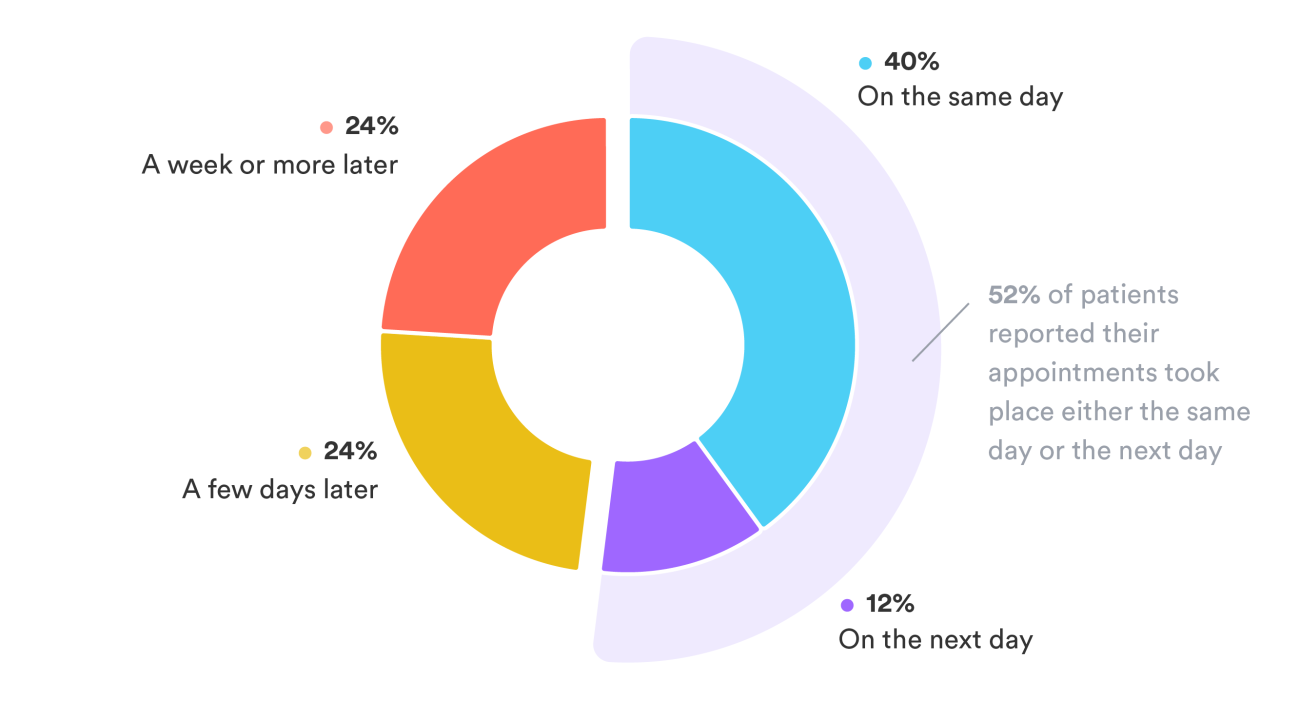It’s clear that many patients struggle to book appointments at GP practices in England, and NHS England have rightly made it a priority to tackle the “8am rush for GP appointments” in their recently published delivery plan for recovering access to primary care. Waiting for appointments has become a big source of concern for the British public. One of the main reasons that people are dissatisfied with health services is waiting times for GP and hospital appointments, as the results of the most recent British Social Attitudes survey show.
We know there are patients who try to book a GP appointment and cannot get through. While policy-makers are working hard to tackle those problems for those who are unable to get through to book an appointment at their GP practice, there is a separate question about how long people who are able to book an appointment then wait to be seen. In this blog, I look at the data for those patients who have been able to get a GP appointment in England, and ask how long those patients then wait to be seen after booking their appointment.
What does the evidence show?
Data from NHS Digital shows that 43.9% of appointments at GP practices in England in May this year took place on the same day that they were booked. That’s 12 million appointments booked and delivered on the same day by GP practices across the country in one month alone. Looking back a year, or even two years, shows that this figure hasn’t changed much (44.4% in May 2022, and 44.8% in May 2021).
As of May this year, NHS Digital data show more than half of all appointments (51.5%) in England take place within 48 hours of being booked – either on the same day or the following day. This also fits with what patients themselves report. In the latest (2023) General Practice Patient Survey for England, more than half (51.5%) of patients reported that their appointment took place on either the same day or the next day, after initially trying to book their appointment with a GP.
Quick appointment access is not the only issue of concern for patients
Data from NHS Digital shows that, in May this year, 12.7% of appointments at GP practices took place between two and four weeks (15-28 days) after the appointment was booked (see the first chart above). This isn’t necessarily always a bad thing. Sometimes patients – and in fact more than one in five of them (23.2%) – want to be able to book ahead, for a planned but not urgent appointment at a time that is convenient for them. This could, for example, be for a vaccination appointment, a planned medication review, or a smear test. As part of supporting patient choice – and as National Voices lived experience expert Robyn Chappell has strongly argued – GP practices should include the choice to plan and book ahead.
This year’s General Practice Patient Survey backs this up. When asked “if you did not get an appointment, why was that?”, one quarter (24.9%) of patients answered that it was because they couldn’t book ahead at their GP practice, and almost a third (31.8%) said it was because they couldn’t get an appointment on the day or time they wanted. Only 11.2% listed the reason as “the appointment wasn’t soon enough”.
However, it’s essential to recognise that the survey also shows that 28% of patients report a poor experience of booking an appointment at their GP practice. Together these results suggest that, while most patients who do get an appointment with a GP receive one within 48 hours of initially trying to book, a significant number of patients – almost a third – find that the process of contacting their practice and making an appointment is difficult, and some patients (12%) who contact their GP practice are not offered an appointment. While the data available can tell us about the amount of time between booking and delivery of an appointment, it cannot tell us how long it took to book an appointment in the first place.
Getting the right policy
A delay in getting a GP appointment for an urgent and serious health problem is unacceptable to the public, and rightly so. Yet while it’s understandable that the public are concerned about waiting too long, the findings above show that more than half of all appointments booked at GP practices in England do actually take place quite quickly, either on the same or next day.
With a general election to take place by the end of next year, the political pressure to promise quicker access to GP appointments is high, yet placing an “expectation” – as proposed by the government last year – that everyone seeking an appointment with a GP should get one within 14 days may be misplaced.
Improving patients’ experience of contacting their GP practice, as NHS England is already focused on doing, is a critical first step. But improving access in general practice also means getting the right mix of access, as I have argued before; ensuring patients can book ahead of time; and potentially managing demand for on-the-day appointments. While there is a strong narrative that frames the solution to the woes of GP practices in England as patients needing quicker access to GP appointments, this doesn’t reveal the full story and is not necessarily the right policy fix.
Suggested citation
Paddison C (2023) “How long are patients waiting for a GP appointment in England?”, Nuffield Trust blog

